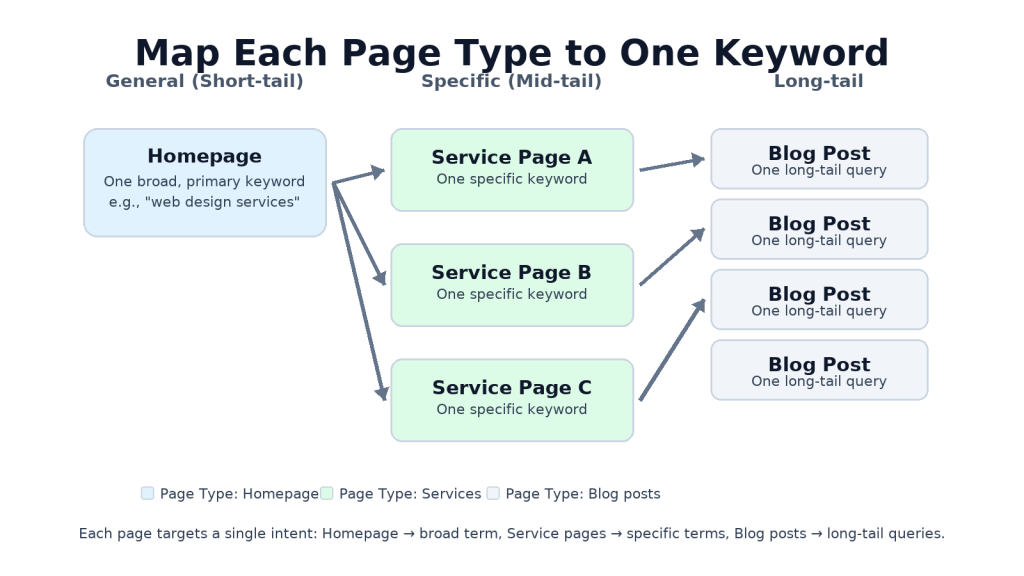Why should every page on your website focus on one keyword?
Each page on your website should target a single keyword or phrase because it helps search engines understand the page’s purpose, increases your chances of ranking, and attracts the right audience. By focusing, you avoid keyword cannibalization and give both Google and users a clear reason to click.
Table of Contents
1. What does “one keyword per page” mean in SEO?
2. How does focusing on one keyword improve rankings?
3. What happens if you target too many keywords?
4. How to choose the right keyword for each page
5. Examples of keyword-focused pages for small businesses
6. Tools to help with keyword research
7. Common mistakes to avoid
8. Next steps for business owners
What does “one keyword per page” mean in SEO?
It means aligning each page with a single primary keyword phrase. For example, your homepage might target “Grand Rapids web design,” while your services page might target “WordPress website development.” Supporting variations (secondary keywords) can be included, but one main keyword rules.
How does focusing on one keyword improve rankings?
Search engines like Google reward clarity. If a page clearly signals one main topic, Google is more confident to show it for that query. This also prevents competing pages on your own site from confusing algorithms (a problem called “keyword cannibalization”).

What happens if you target too many keywords?
- Rankings get diluted.
- Google may not know which query to match your page with.
- You risk splitting clicks across multiple weakly targeted pages.
- This is why most modern SEO guides — including Google’s Search Essentials — recommend focusing one page per query.
How to choose the right keyword for each page
- Identify intent → Is the user looking to buy, learn, or compare?
- Localize if relevant → “Web design Grand Rapids” vs “web design services.”
- Check search volume → Use tools like Google Keyword Planner or SEMrush.
- Map your site → Assign one primary keyword to each URL.
Examples of keyword-focused pages for small businesses
- Homepage: “Grand Rapids landscaping company”
- Service Page: “lawn care services Grand Rapids”
- Blog Post: “Best time to aerate your lawn in Michigan”

Tools to help with keyword research
- Google Keyword Planner (free)
- Answer the Public (great for question-based keywords)
- SEMRush / Ahrefs (paid, powerful for competitors + volumes)
Common mistakes to avoid
- Trying to rank one page for 5–10 different phrases.
- Copying keyword lists from competitors without context.
- Ignoring local intent when your business serves a region.
Next steps for business owners
Audit your current site → assign one keyword per page → restructure titles, meta descriptions, headers, and URLs to reflect that focus.
👉 Want to know if your website pages are targeting the right keywords?
Book a Website Audit and we’ll map your keywords for you — so Google knows exactly what each page is about.
👉 Want to know if your website pages are targeting the right keywords?
Book a Website Audit and we’ll map your keywords for you — so Google knows exactly what each page is about.
Key Takeaways
- Each page should target one main keyword.
- Helps Google understand intent → better rankings.
- Prevents keyword cannibalization.
- Use supporting keywords, but only one primary per page.
- Start by auditing your current site and remapping pages.
